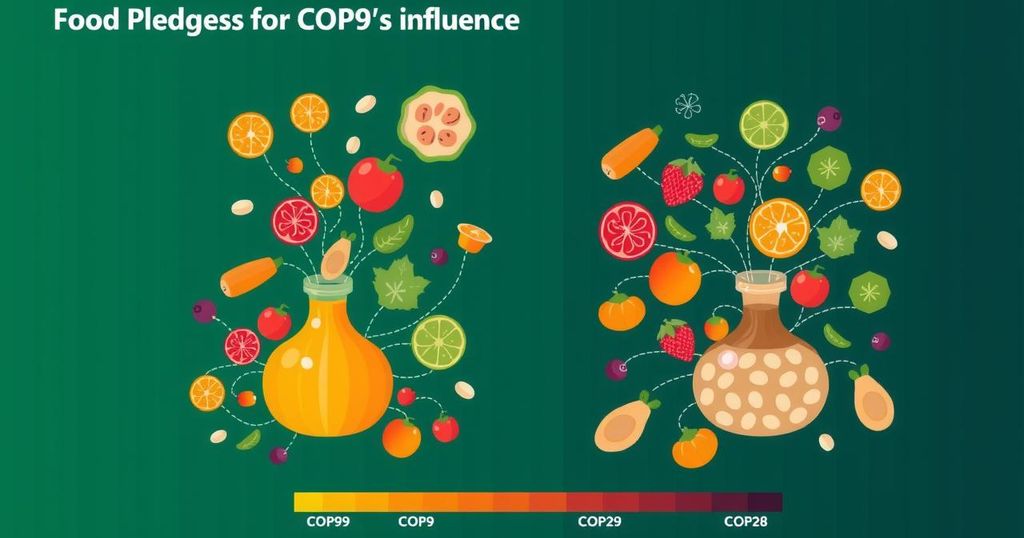At COP29 in Baku, leaders aim to address food system emissions, a critical factor in climate change, as previous commitments by 160 countries face challenges in implementation. The UK and other Global North nations are urged to reform their dietary habits to meet climate goals effectively. Meanwhile, scrutiny surrounds the UN’s roadmap for food systems, although some coalitions, like the Alliance of Champions, show promise by working towards agricultural reforms. The outcomes of this conference could significantly influence global food policies going forward.
As global leaders convene in Baku, Azerbaijan, for the 29th United Nations Climate Change Conference (COP29), the focus remains on food emissions, a critical challenge as food systems account for a significant portion of global greenhouse gas emissions, primarily driven by meat consumption. At COP28, more than 160 countries pledged to integrate sustainable agriculture and food systems into their national climate plans, yet the implementation of these commitments remains sluggish. Only a small number of countries are expected to present revised plans at COP30, indicating a broader issue of inertia among pledged nations. The UK’s commitment to revising its Nationally Determined Contributions (NDCs) calls attention to the need for dietary shifts towards plant-based consumption, echoing sentiments from scientists who argue that major Global North countries must undertake substantial dietary changes to meet climate goals. Progress is hindered by political sensitivities surrounding dietary changes, particularly regarding meat consumption. Moreover, while the United Nations Roadmap for food systems presents a plan to address emissions alongside food security, implementation has stalled amid criticism regarding its clarity and effectiveness. Concerns about misaligned methodologies surfaced after a report published at COP28, leading to calls for better stakeholder engagement in the roadmap’s development. Conversely, some initiatives, such as the Alliance of Champions for Food Systems Transformation, have shown promise. This coalition, consisting of nations including Norway and Brazil, is actively working to reform food systems in their respective countries, exemplified by Sierra Leone’s successful agricultural improvements without environmental degradation. The hope remains that actions taken at COP29 will create a cohesive strategy for global food system transformation that addresses both climate and health concerns effectively.
The 29th United Nations Climate Change Conference, commonly referred to as COP29, is occurring against a backdrop of urgent calls for transformative change in global food systems. The previous COP28 initiated significant discussions about the climate impact of food emissions, prompting over 100 countries to commit to improving food production and consumption practices by 2025. As global food systems are a significant contributor to greenhouse gas emissions, particularly from meat and dairy, addressing these issues through national climate plans is critical. However, the commitment to this cause has seen limited progress, as many signatory nations have yet to integrate food systems into their national climate strategies, revealing systemic inertia and a lack of urgency to tackle the pressing challenges posed by climate change. The recent scrutiny of the United Nations’ roadmap for food systems transformation further complicates the landscape, as questions about its alignment with expert views and its practical applicability have emerged. Despite these challenges, certain coalitions like the Alliance of Champions for Food Systems Transformation have made headway, highlighting potential pathways for reform even amidst broader stagnation in global policy efforts.
COP29 presents a pivotal opportunity for world leaders to act decisively on food systems and their climate implications. While pledges from COP28 demonstrated a willingness for change, the slow pace of actual transformation suggests that substantial efforts are required to translate commitments into actionable plans. The emphasis on integrating food systems into national climate strategies is essential, particularly within Global North countries, which bear a significant burden of agricultural emissions. The effectiveness of initiatives like the Alliance of Champions offers a glimpse into potential successes. However, for meaningful progress to occur, sustained engagement and collective ambition are essential to align agriculture with climate objectives globally.
Original Source: impakter.com






